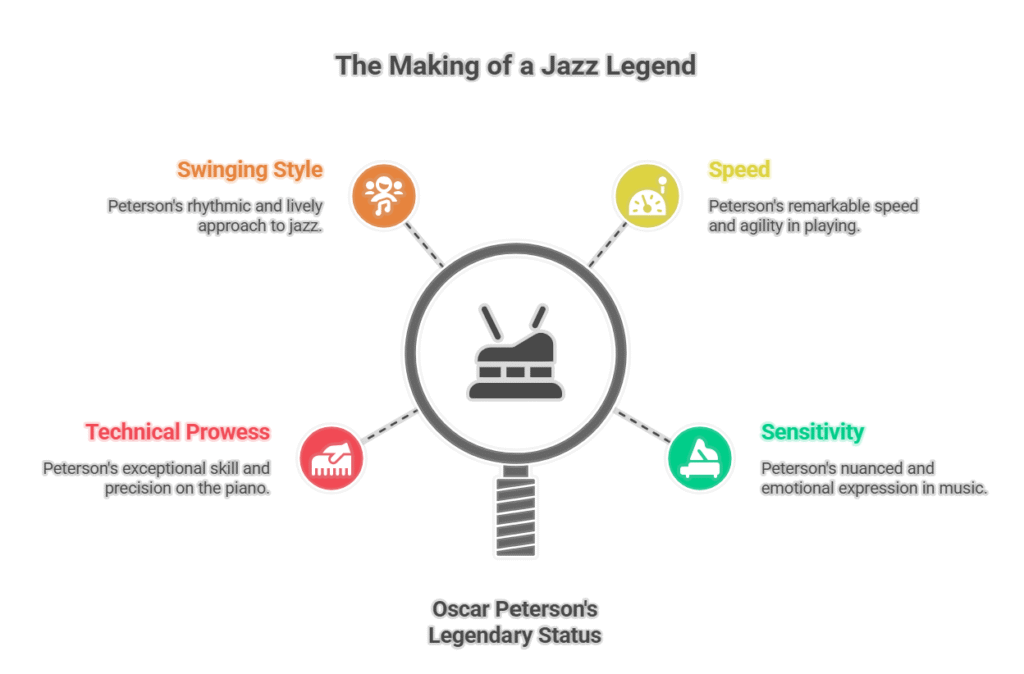piano jazz man stand out in the world of music? Maybe you’ve listened to a late-night jazz set and found yourself mesmerized by the effortless flow of notes, the improvisational genius, or the sheer charisma of the person behind the keys. The journey of a piano jazz man is filled with passion, innovation, and a relentless pursuit of musical excellence. Today, we’ll dive deep into the world of jazz pianists—exploring the lives, styles, and legacies of the well known piano players who have shaped this genre for generations.
The Allure of the Piano Jazz Man
There’s something magnetic about a piano jazz man. Whether it’s the way their fingers dance across the keys or the soulful stories they tell through music, these artists have a unique ability to connect with audiences. But what exactly sets them apart from other musicians? Is it their technical skill, their creative spirit, or the rich history they carry forward?
For many, the piano jazz man represents the heart and soul of jazz itself. From smoky clubs in New York to grand concert halls in Paris, these musicians have left an indelible mark on the world of music.
A Brief History: The Rise of Jazz Pianists
Jazz piano has a rich and colorful history. In the early 20th century, jazz emerged from the cultural melting pot of New Orleans, blending African rhythms, blues, and ragtime. The piano quickly became a central instrument, offering both rhythmic support and melodic freedom.
Some of the greatest jazz pianists—like Jelly Roll Morton, Duke Ellington, and Fats Waller—helped define the genre’s early sound. Their innovative techniques and bold improvisations paved the way for future generations of famous pianist players.
What Makes a Great Piano Jazz Man?
So, what qualities define the best jazz pianists? It’s not just about technical mastery (though that certainly helps). The true piano jazz man brings a blend of creativity, emotional depth, and a willingness to take risks.
- Improvisation: At the core of jazz is improvisation. The best jazz pianists can create magic on the spot, weaving new melodies and harmonies with every performance.
- Rhythmic Complexity: Jazz is known for its syncopated rhythms and swing feel. A skilled piano jazz man can navigate these complexities with ease.
- Emotional Expression: Jazz is about telling a story. The greatest jazz pianists pour their hearts into every note, making each performance unique.
Well Known Piano Players Who Changed Jazz Forever
Let’s take a closer look at some of the most well known piano players who have left an unforgettable legacy in jazz.
Art Tatum: The Virtuoso
Art Tatum is often cited as one of the best jazz pianists of all time. His lightning-fast runs, complex harmonies, and innovative use of rhythm set a new standard for jazz piano. Many musicians, both in jazz and beyond, have cited Tatum as a major influence.
Thelonious Monk: The Innovator
Thelonious Monk’s unique approach to harmony and rhythm made him one of the most famous pianist players in jazz history. His compositions, like “Round Midnight” and “Blue Monk,” are now jazz standards, and his quirky, angular playing style remains instantly recognizable.
Bill Evans: The Poet
Bill Evans brought a new level of lyricism and introspection to jazz piano. His work with the Miles Davis Sextet, especially on the album “Kind of Blue,” helped redefine the role of the piano in jazz ensembles.
Herbie Hancock: The Trailblazer
Herbie Hancock’s career spans more than six decades, and he’s still going strong. From his early days with Miles Davis to his groundbreaking work in jazz fusion and electronic music, Hancock is a true piano jazz man who’s never stopped innovating.
The Greatest Jazz Pianists: A Closer Look
When people talk about the greatest jazz pianists, a few names always come up. But what makes these artists so special? Let’s explore their unique contributions.
Oscar Peterson: The Powerhouse
Oscar Peterson’s technical prowess and swinging style made him a legend. His performances are a masterclass in both speed and sensitivity, and his recordings remain essential listening for any aspiring piano jazz man.

Chick Corea: The Explorer
Chick Corea was known for his adventurous spirit and genre-blending approach. Whether playing straight-ahead jazz, Latin jazz, or fusion, Corea’s creativity knew no bounds.
McCoy Tyner: The Architect
McCoy Tyner’s work with the John Coltrane Quartet helped shape the sound of modern jazz. His powerful left hand and innovative chord voicings have influenced countless jazz pianists.
Famous Pianist Players: Beyond the Legends
While the legends get most of the attention, there are many other famous pianist players who have made significant contributions to jazz.
- Mary Lou Williams: A pioneering female jazz pianist and composer.
- Horace Silver: Known for his catchy, blues-infused compositions.
- Keith Jarrett: Renowned for his solo improvisations and genre-defying performances.
Each of these artists brought something unique to the table, proving that the world of jazz piano is as diverse as it is dynamic.
The Best Jazz Pianists of Today
Jazz is a living, breathing art form, and today’s best jazz pianists are carrying the torch forward. Some contemporary piano jazz men to watch include:
- Brad Mehldau: Known for his lyrical improvisations and genre-crossing collaborations.
- Hiromi Uehara: A virtuoso with a flair for blending jazz, classical, and rock.
- Robert Glasper: Fusing jazz with hip-hop, R&B, and soul.
These artists are redefining what it means to be a piano jazz man in the 21st century.
The Art of Jazz Piano: Styles and Techniques
Jazz piano is incredibly versatile. From stride and swing to bebop and beyond, each style demands its own set of skills.
Stride Piano
Stride piano, popularized by James P. Johnson and Fats Waller, features a left hand that “strides” between bass notes and chords. It’s energetic, rhythmic, and perfect for solo performances.
Bebop
Bebop pianists like Bud Powell pushed the boundaries of harmony and rhythm. Fast tempos, complex chord changes, and intricate improvisations define this style.
Modal Jazz
Modal jazz, championed by Bill Evans and McCoy Tyner, uses scales (modes) as the basis for improvisation. This approach allows for greater freedom and exploration.
Fusion
Jazz fusion blends jazz with rock, funk, and electronic music. Herbie Hancock and Chick Corea are two of the best jazz pianists in this genre, constantly pushing the envelope.
Real-Life Inspiration: The Piano Jazz Man’s Journey
One jazz fan recently shared, “I saw Herbie Hancock live last year, and it changed my life. The way he played—so spontaneous, so full of joy—reminded me why I fell in love with jazz in the first place.”
Stories like this highlight the profound impact a piano jazz man can have on listeners. It’s not just about the notes; it’s about the experience.
The Role of Jazz Pianists in Modern Music
Jazz pianists aren’t just confined to jazz clubs anymore. Today, you’ll find them collaborating with pop stars, composing for films, and even teaching online masterclasses. Their influence extends far beyond the jazz world.
- Collaboration: Many well known piano players work with artists from other genres, bringing jazz sensibilities to new audiences.
- Education: The best jazz pianists often share their knowledge through workshops, books, and online courses.
- Innovation: Jazz pianists are at the forefront of musical innovation, constantly experimenting with new sounds and technologies.
The Pros and Cons of Being a Piano Jazz Man
Pros
- Creative Freedom: Jazz offers unparalleled opportunities for self-expression.
- Community: The jazz world is tight-knit and supportive.
- Legacy: Jazz pianists are part of a rich musical tradition.
Cons
- Financial Uncertainty: Jazz isn’t always the most lucrative genre.
- Constant Learning: The best jazz pianists never stop practicing and evolving.
- Niche Audience: Jazz appeals to a smaller, though passionate, audience.
Features of a Great Jazz Pianist in 2025
What does it take to be a standout piano jazz man today? Here are some key features:
- Versatility: The ability to play multiple styles and adapt to different settings.
- Technical Skill: Mastery of the instrument is a must.
- Originality: Bringing something new to the table is essential.
- Digital Savvy: In 2025, many jazz pianists use social media, streaming, and online lessons to reach fans.
The Risks and Rewards of Jazz Piano
Pursuing a career as a piano jazz man comes with its own set of risks and rewards.
- Risk: The music industry is competitive, and jazz can be a tough field to break into.
- Reward: The satisfaction of creating something truly original and connecting with audiences on a deep level.
How to Become a Piano Jazz Man: Tips for Aspiring Musicians
If you’re inspired to follow in the footsteps of the greatest jazz pianists, here are some tips:
- Listen Widely: Study recordings by well known piano players and learn from their styles.
- Practice Daily: Consistency is key to mastering the instrument.
- Learn Theory: Understanding jazz harmony and improvisation is essential.
- Play with Others: Jazz is a collaborative art form—find other musicians to jam with.
- Stay Curious: The best jazz pianists are always exploring new ideas.
The Future of Jazz Piano: Trends to Watch in 2025
Jazz is always evolving, and the piano jazz man of 2025 is embracing new trends:
- Technology Integration: From digital pianos to AI-assisted composition, technology is changing the way jazz is created and performed.
- Global Influences: Jazz pianists are drawing inspiration from world music, creating exciting new fusions.
- Online Presence: Social media and streaming platforms are helping jazz pianists reach wider audiences than ever before.
FAQs
1. Who are some well known piano players in jazz?
Some of the most well known piano players in jazz include Art Tatum, Thelonious Monk, Bill Evans, Herbie Hancock, and Oscar Peterson. Each brought their own unique style and innovation to the genre.
2. Who are considered the greatest jazz pianists of all time?
The greatest jazz pianists often mentioned are Art Tatum, Bill Evans, Thelonious Monk, Oscar Peterson, and Chick Corea. Their influence can be heard in countless recordings and live performances.
3. What makes a famous pianist player stand out in jazz?
A famous pianist player stands out through a combination of technical skill, creativity, and the ability to connect emotionally with audiences. Improvisation and originality are key traits.
4. Who are the best jazz pianists performing today?
Some of the best jazz pianists today include Brad Mehldau, Hiromi Uehara, Robert Glasper, and Gerald Clayton. They’re known for pushing boundaries and keeping jazz piano fresh and exciting.
Final Thoughts
The world of the piano jazz man is as vibrant and inspiring as ever. From the legends of the past to the innovators of today, jazz pianists continue to shape the sound of modern music. Whether you’re a lifelong fan or just discovering the genre, there’s always something new to explore.
CLICK HERE FOR MORE BLOG POSTS
John Authers is a seasoned and respected writer whose work reflects the tone, clarity, and emotional intelligence that readers value in 2025. His writing blends deep insight with a natural, human voice—making complex ideas feel relatable and engaging. Every piece he crafts feels thoughtful, original, and genuinely worth reading.

